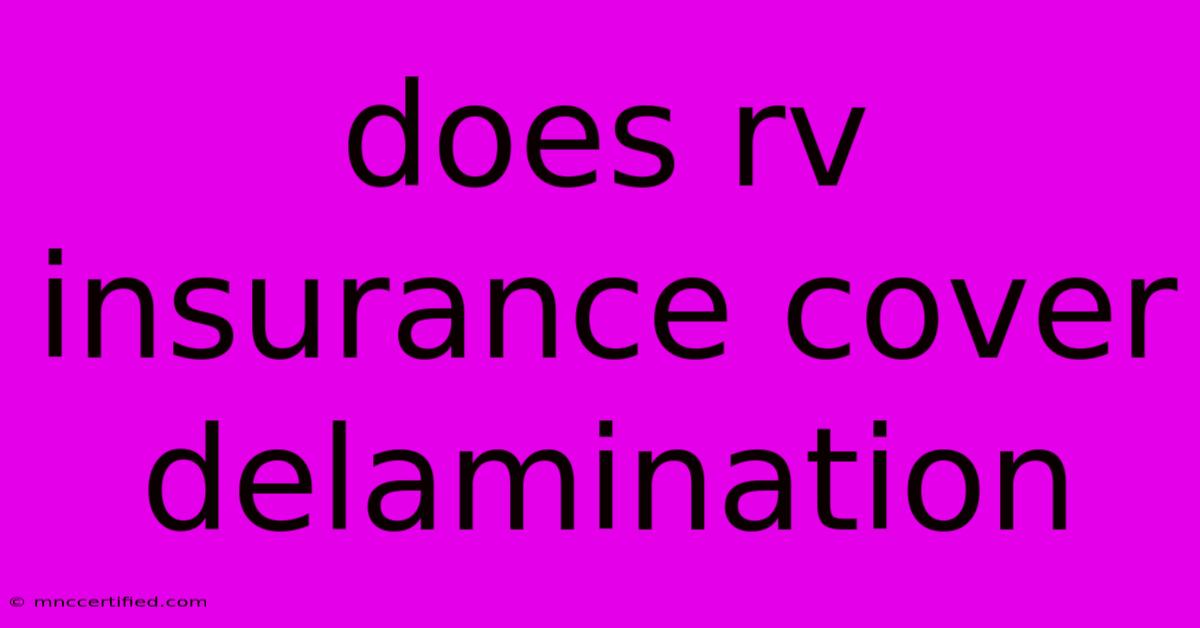Does Rv Insurance Cover Delamination

Table of Contents
Does RV Insurance Cover Delamination? A Comprehensive Guide
Delamination, the separation of layers in your RV's fiberglass or other composite materials, can be a costly problem. But does your RV insurance cover it? The answer, unfortunately, isn't a simple yes or no. RV insurance coverage for delamination is complex and depends on several factors.
Understanding RV Insurance and Delamination
RV insurance policies vary widely, and what's covered by one insurer may not be covered by another. Delamination is often considered a "wear and tear" issue, which generally isn't covered by standard RV insurance policies.
However, there are some scenarios where delamination may be covered:
- Manufacturer Defects: If the delamination is caused by a defect in the manufacturing process, your insurance policy might cover it, especially if it falls under the manufacturer's warranty.
- Accidental Damage: Delamination resulting from an accident or covered event, like a hail storm or collision, is more likely to be covered by your insurance.
- Specific Coverage Add-ons: Some RV insurance policies offer optional coverage for wear and tear issues, including delamination. This usually comes at an extra cost, but it can provide peace of mind.
How to Determine Coverage
- Review Your Policy: Carefully read your RV insurance policy and look for specific clauses related to delamination, wear and tear, or manufacturer defects.
- Contact Your Insurance Provider: If you're unsure about your coverage, contact your insurance agent directly. They can provide detailed information about your specific policy and help you understand what's covered.
- Seek Expert Advice: Consulting an RV repair specialist can help you determine the cause of the delamination. Their assessment may provide valuable information to support your insurance claim.
Protecting Yourself from Delamination
- Regular Maintenance: Routine inspections and proper maintenance of your RV can help prevent delamination and other wear and tear issues.
- Consider Extended Warranty: An extended warranty can offer additional coverage for delamination and other problems that may occur after the manufacturer's warranty expires.
- Choose a Reputable Manufacturer: Researching and choosing an RV from a reputable manufacturer with a strong track record can help reduce the risk of manufacturing defects.
In Conclusion
While RV insurance coverage for delamination can be tricky, understanding your policy and taking proactive steps can help you protect yourself. It's essential to review your insurance policy, contact your provider, and consider additional coverage options to ensure you have adequate protection against this potentially costly issue.

Thank you for visiting our website wich cover about Does Rv Insurance Cover Delamination. We hope the information provided has been useful to you. Feel free to contact us if you have any questions or need further assistance. See you next time and dont miss to bookmark.
Featured Posts
-
Cardinals Outlast Jets Earn First Place Lead
Nov 11, 2024
-
Horace Mann Insurance Company Claims
Nov 11, 2024
-
Goffs 5 Ints Lions Win Despite Qb Struggles
Nov 11, 2024
-
Who Pays For Title Insurance In Ohio
Nov 11, 2024
-
Brown Smith Healthy No Injury Designations
Nov 11, 2024